10 Best Real Estate APIs for PropTech in 2025

Real estate enterprises depend critically on versatile data in their workflows, and proptech solutions they leverage in their shop floor processes are supposed to put the repositories of the necessary information at their disposal 24/7. To keep such access channels open, the best proptech apps should possess a robust system of real estate APIs.
This article explains what an API for real estate is, showcases its benefits for companies in the sector, offers a roster of the best real estate APIs, and lists crucial criteria for selecting high-quality products of this type.
What is a Real Estate API?
Modern professional software pieces almost never operate as isolated products. Instead, they act as elements of a comprehensive enterprise-wide ecosystem that must communicate and work in harmony with each other. Used by 71% of organizations as services provided by SaaS vendors and other third parties, APIs function as intermediaries, enabling seamless integration of multiple components of a company’s unified IT platform.
What is API used for in real estate? Its purpose is a little bit different from their conventional roles. Here, application programming interfaces become reliable gateways for accessing a multitude of reports and data sources (including MLS listings, rental price information, mortgages, climate risk predictions, noise pollution indices, crime statistics, available schools, and other neighborhood data).
Moreover, real estate data API solutions promise numerous boons not only to property agents, brokers, investors, and other stakeholders in the real estate market. Software development teams find them extremely useful as well.
Zooming in on the Benefits of Real Estate APIs

For industry experts, leveraging the best real estate API guarantees:
Real-time access to relevant data
With such APIs in place, real estate professionals have all listings, prices, property parameters, etc., at their fingertips. They can access massive databases from a desktop, smartphone, or tablet and share information with colleagues and customers.
Data-driven insights
Most APIs are equipped with analytical features enabling experts to compare rates and features, forecast property prices, expose market trends and dynamics, generate statistical reports, boost decision-making, and automate the lion’s share of their workflows.
Enhanced customer satisfaction
By capturing individual buyer requests and quickly delivering up-to-date information to the clientele, real estate agencies can find the best purchase or rental option for a person or organization, thus ensuring the high quality of services they obtain. Software teams also benefit from leveraging these APIs, since they usher in:
Cost-efficient development
Crafting a new proptech solution’s features is a long process requiring much effort and, therefore, quite costly. APIs allow development crews to obtain new capabilities immediately for a pretty affordable subscription fee.
Shorter time-to-market
A real estate API for developers is a huge time-saver. They don’t have to write functionalities or configure databases from scratch. Resorting to APIs, they accelerate SDLC immensely and deliver the finished product much faster.
Seamless AI/ML integration
Modern APIs are compatible with cutting-edge know-how, allowing IT teams to integrate disruptive tools into proptech solutions, which boosts their analytical capabilities and predictive powers.
Let’s go through high-profile real estate APIs that reign supreme in the industry.
Top Real Estate APIs for Businesses to Consider in 2025
1.ATTOM
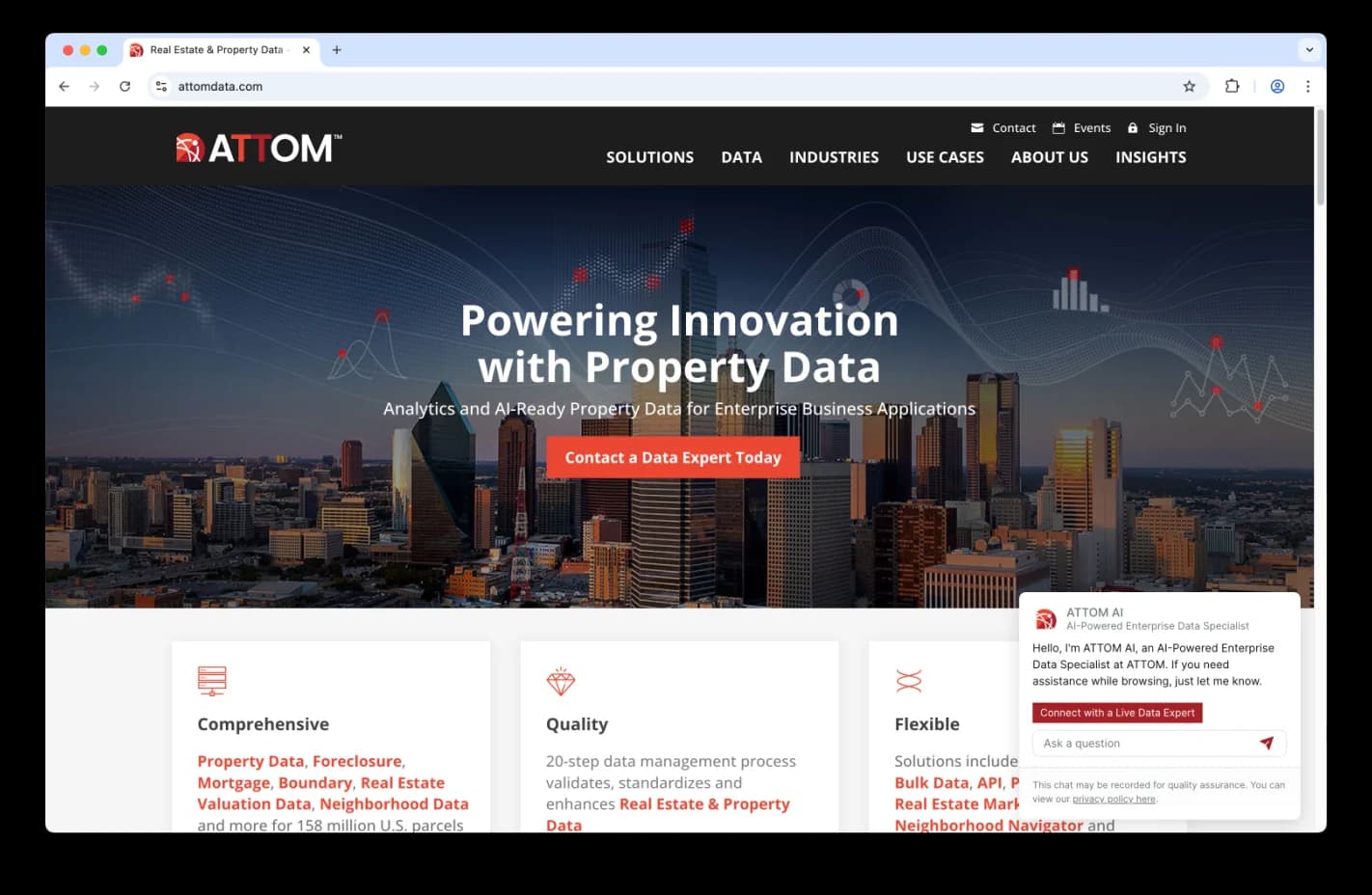
This is a universally recognized leader in the USA that delivers property, environmental, neighborhood, valuation, tax, cost trends, and other information to experts in the field. Integrating ATTOM API into your professional product gives you easy access to databases owned by county assessor and recorder offices, real estate agencies, school rating services, and other public institutions.
The solution’s features include:
- Property data on 155 million US objects with addresses, ownership and mortgage details, sales history, and more.
- Area data: district boundary map, school attendance zones, and others.
- Community data: population size, commuter times, crime rates, weather stats, etc.
- Points of interest: restaurants, shops, banks, recreational facilities.
You can enjoy this real estate API free of charge for a trial period of 30 days. After it is over, you can opt for one of the subscription plans ranging from $850 to $2,000 a month.
2.Zillow API
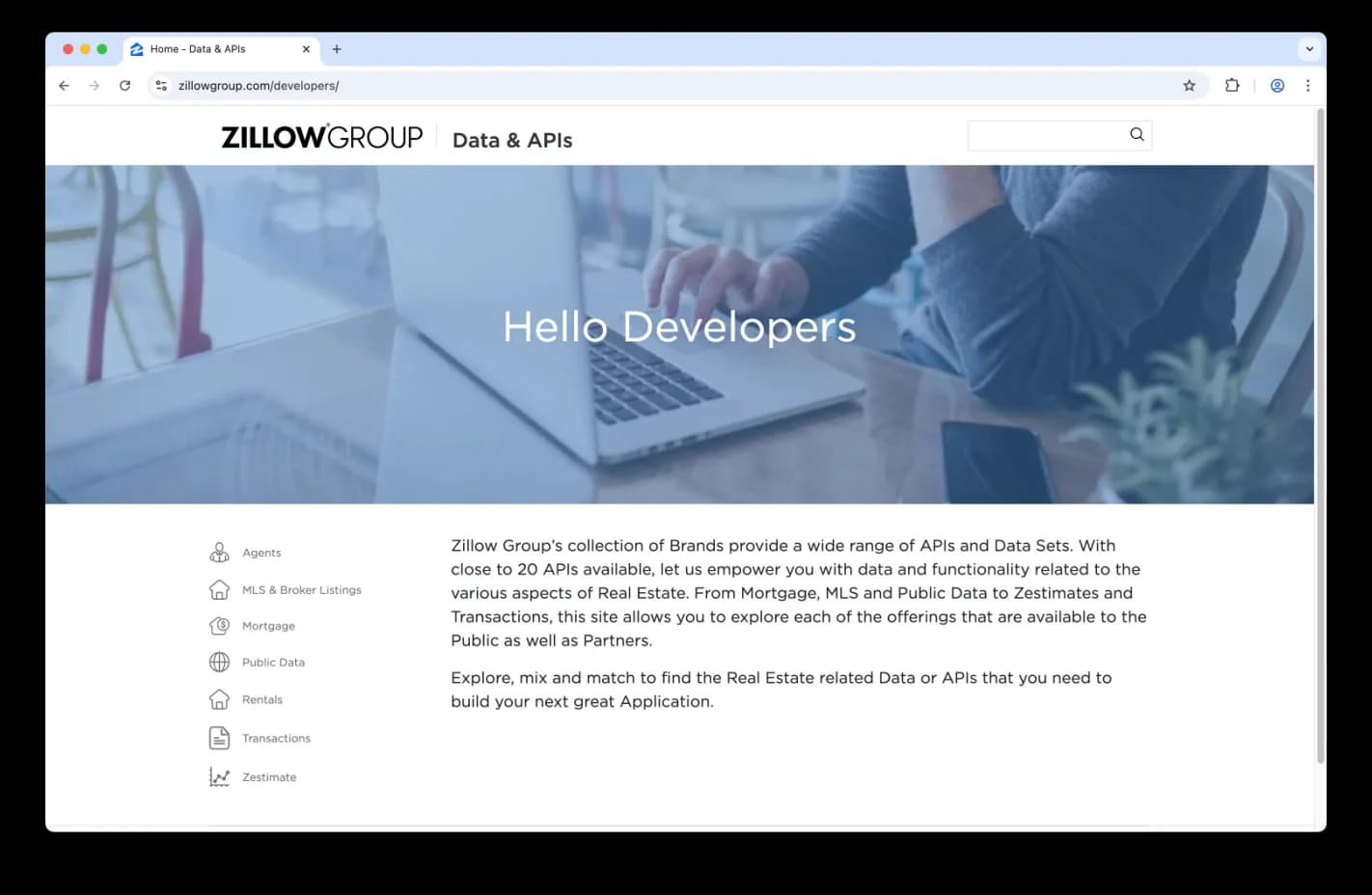
In fact, this is not one product but a collection of about 20 APIs that help users find information on 100 million US-based properties. Software developers can utilize them to build niche mobile apps, websites, research solutions, data analysis tools, and more.
Capabilities of this API cover:
- Information from user-submitted sources, public records, and proprietary algorithms.
- Property details (photos, facts, rental prices, mortgage rates, etc.).
- Home estimated market values.
- Neighborhood data.
- Mortgage affordability calculator.
The greatest shortcoming of this API is its narrow availability (by invitation only) and limited data access determined by American and Canadian MLS partners. Basically, it is a free real estate API product as long as it is used for non-commercial purposes. However, if you want to enjoy advanced features, you will have to pay up to $250 per month for them.
3.Datafiniti Property Data API
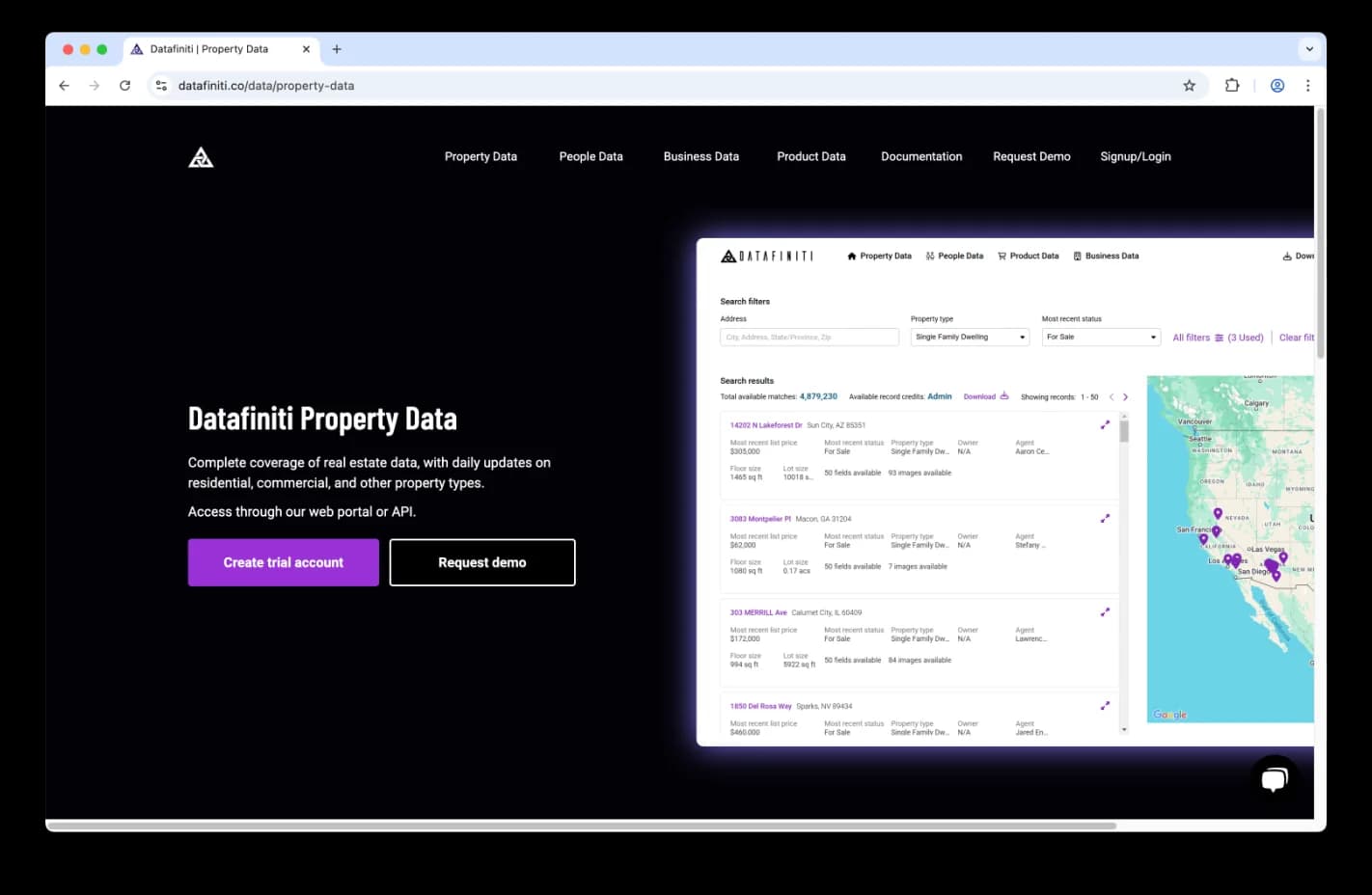
Using this real estate listing API, you can get access to 172 million records concerning both residential and commercial properties. The solution’s characteristics comprise:
- Property info (size, type, year of construction, additional features such as garages, fireplaces, pools, and others).
- Location data (not only traditional address and zip code but latitude and longitude as well).
- Property owner (name and contact information).
- Financial data (sales and rental prices, taxes, etc.).
- Data enrichment capability, allowing users to add property to lists.
The free trial period lasts for two weeks, during which users can survey up to 1,000 records. Fee-paying monthly plans vary from $119 to $3,999.
4.Homesage.ai
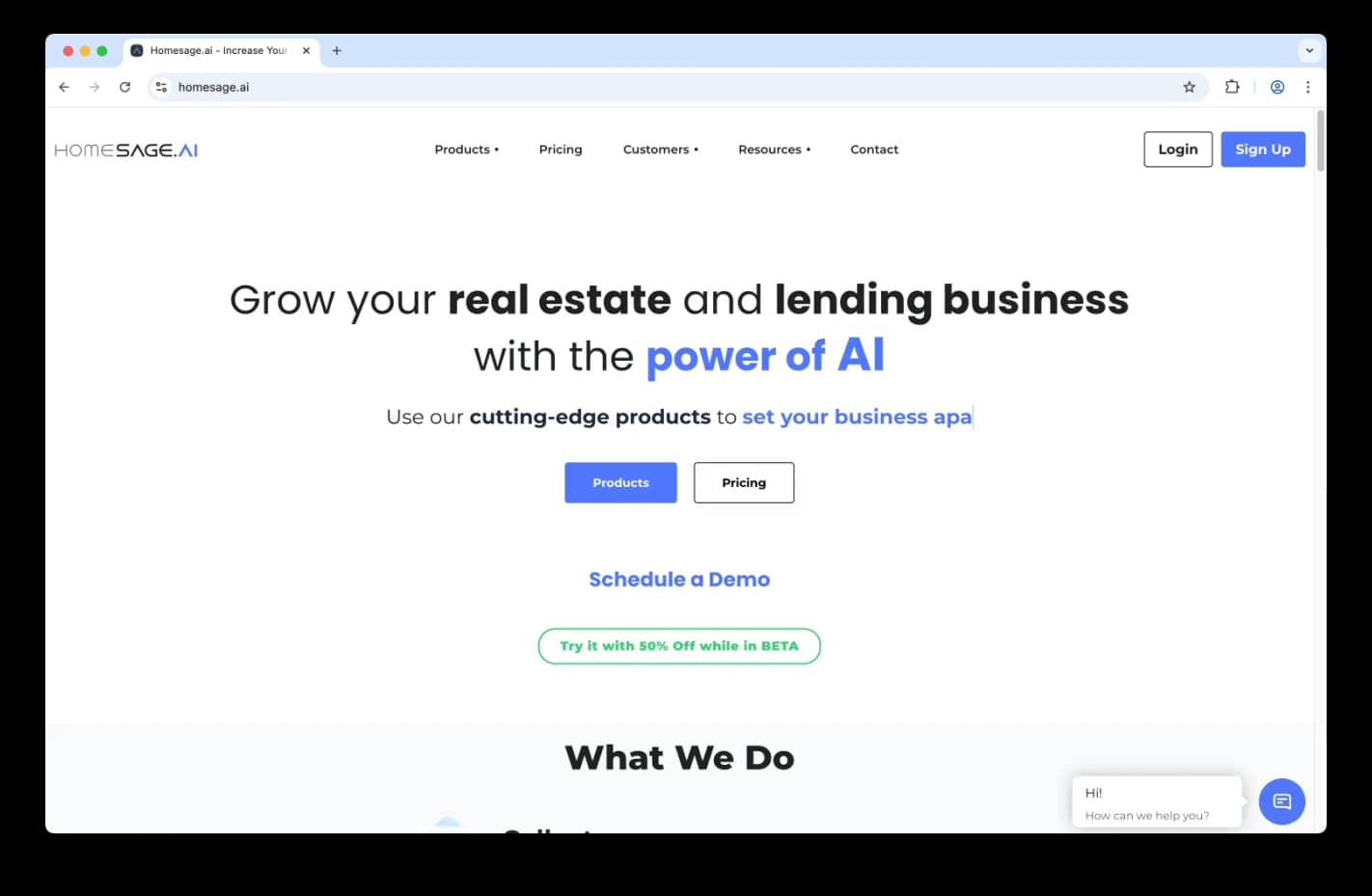
These real estate API features and benefits are honed for enterprise-level customers, such as software developers, realtors, lenders, contractors, you name it. Its AI-powered capabilities provide experts with numerous data-driven insights concerning various aspects of their pipeline processes:
- Property data (anything from price, condition, and history to images and interior details).
- Building information (parking, construction site).
- Rental information (both short-term and long-term).
- Property development data (deal value, estimated value gap, and increase, price flexibility index, renovation costs estimates, etc.).
- Investor data (total project cost, profit, rental and resale ROI, recommended renovation budget, and more).
Being a top-notch commercial real estate API, Homesage.ai has one serious downside — a considerable price tag. Its cheapest option, enabling 500 requests and basic features, costs $200 per month, whereas for the 2,500 requests of the pro plan, you will have to fork out $500, and twice that much for the ultra plan with its 10,000 requests.
5.Realtors Property Resource
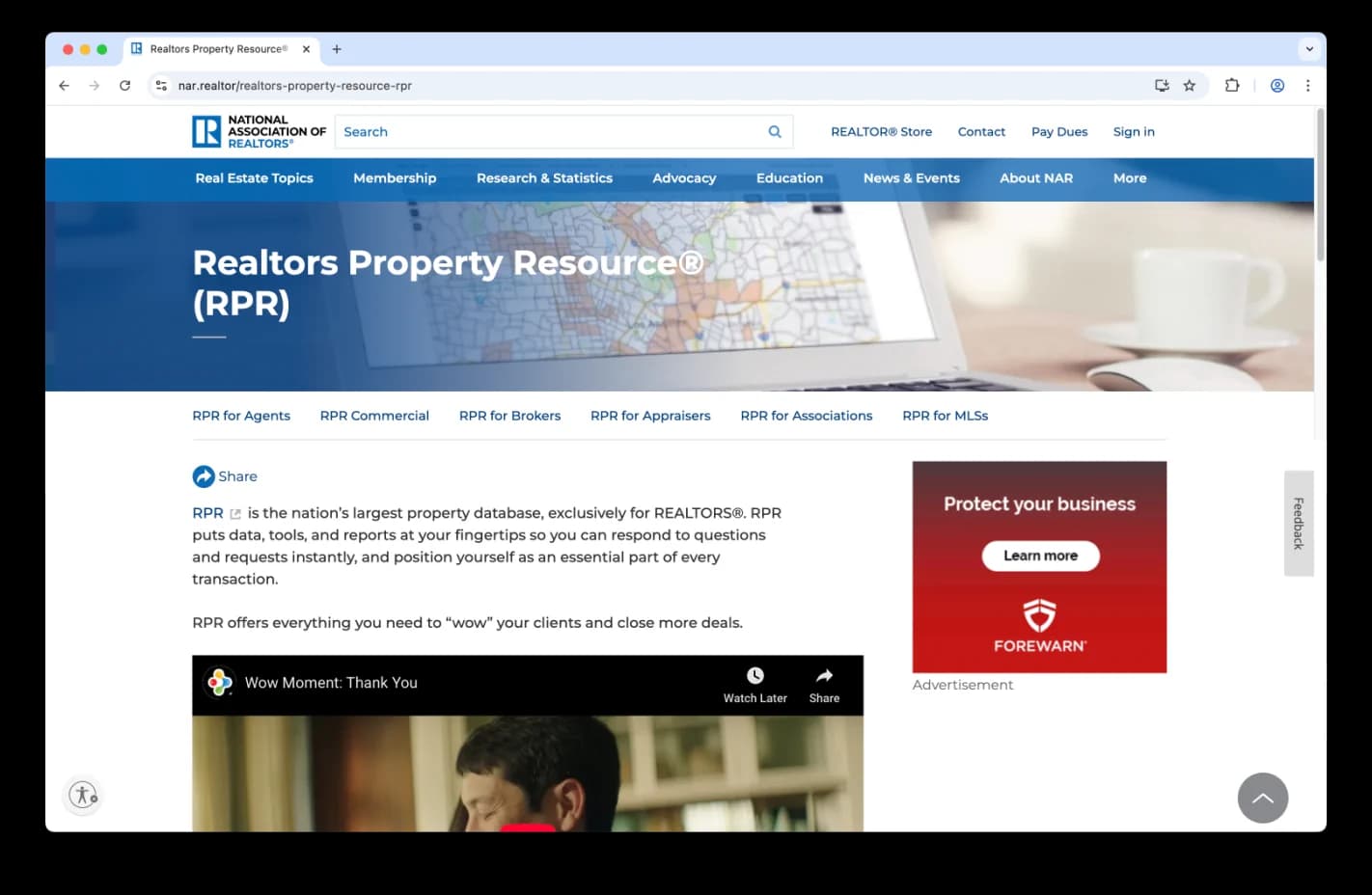
Launched by the National Association of Realtors (NAR), this comprehensive platform offers information, analytics, and reports to its professional users, helping them make knowledgeable business decisions, market their services, interact with customers, and close more deals. By utilizing the API, you can get access to:
- Property data concerning 160 million items across the USA (public records, sales history, deeds, tax assessments, mortgages, flood maps, and more).
- Location data (demographic, spending, and even psychographic info plus opportunity areas and business points of interest in the vicinity).
- Market data (forecasts, trends, and comparisons across several categories).
- Commercial data (verified by CompStak Exchange lease and sales comparisons and Crexi property listings).
Among the cons of this API, one can mention the absence of some vital demographic information (such as climate conditions, infrastructure details, or crime rates). However, the main disadvantage of the platform is its limited availability: it is free, but you can use it only if you are an NAR member via an NRDS ID-authorized account.
6.RealEstateAPI.com
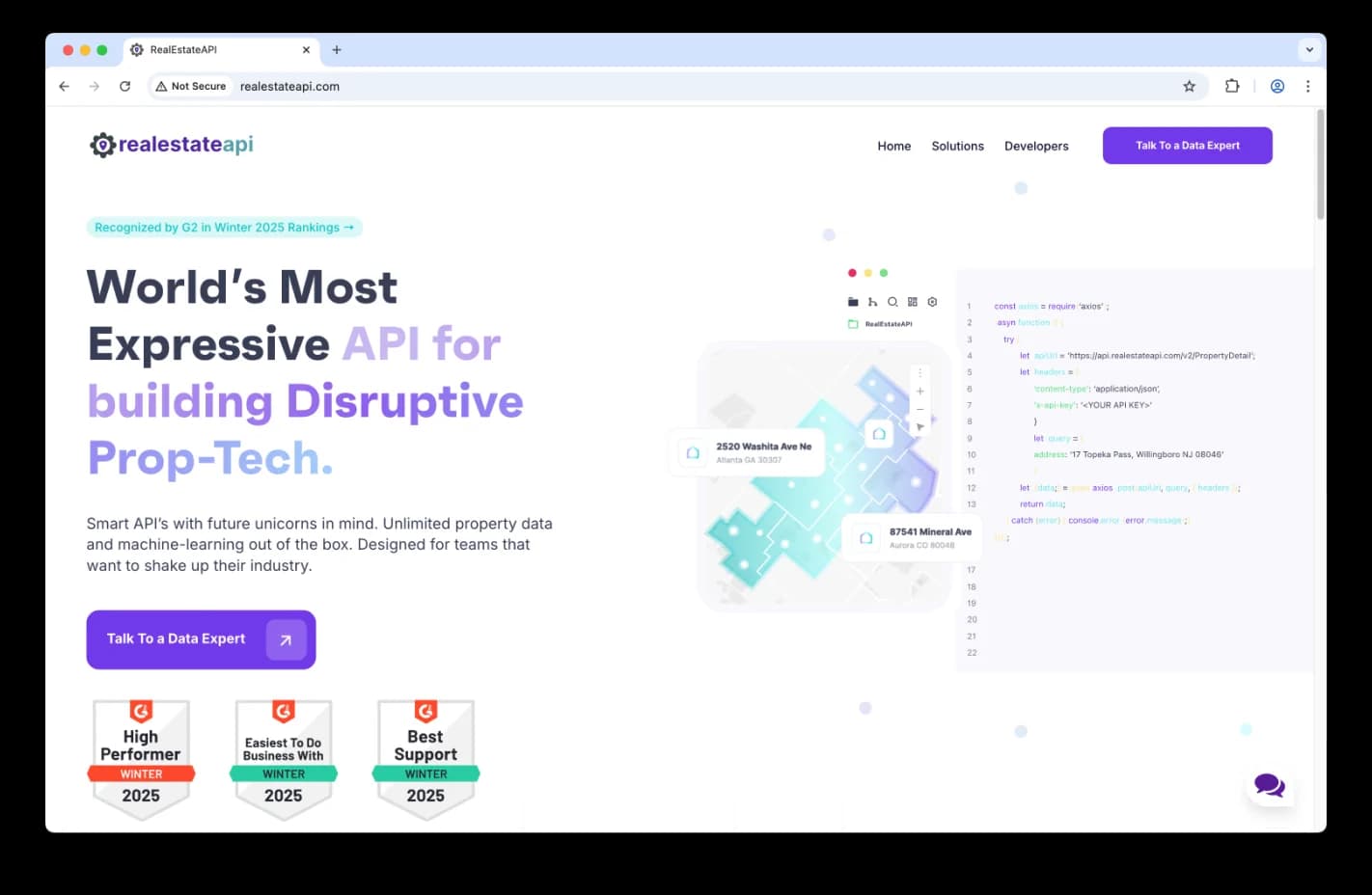
The suite contains not only an API enabling access to over 200 data sources but also a web app featuring search functionality and a CSV generator. Such a combination allows specialists to retrieve, analyze, and manipulate real estate data, including:
- Property info providing both physical (square footage, lot size, bath/bed count) and financial (sales history, liens, tax, mortgage, foreclosure status) details.
- Parcel boundaries with geographical coordinates.
- Comparisons, where users can view current sales of similar properties in the neighborhood.
- Address verification, allowing customers to see if the address is deliverable and valid.
- Property detail and skip trace bulk, enabling users to retrieve property details and contact information for multiple addresses and owners in one request.
You can check out the tools within two weeks free of charge, allowing for 500 API calls a day. If you are satisfied with the performance, contact the vendor for pricing.
7.Mashvisor
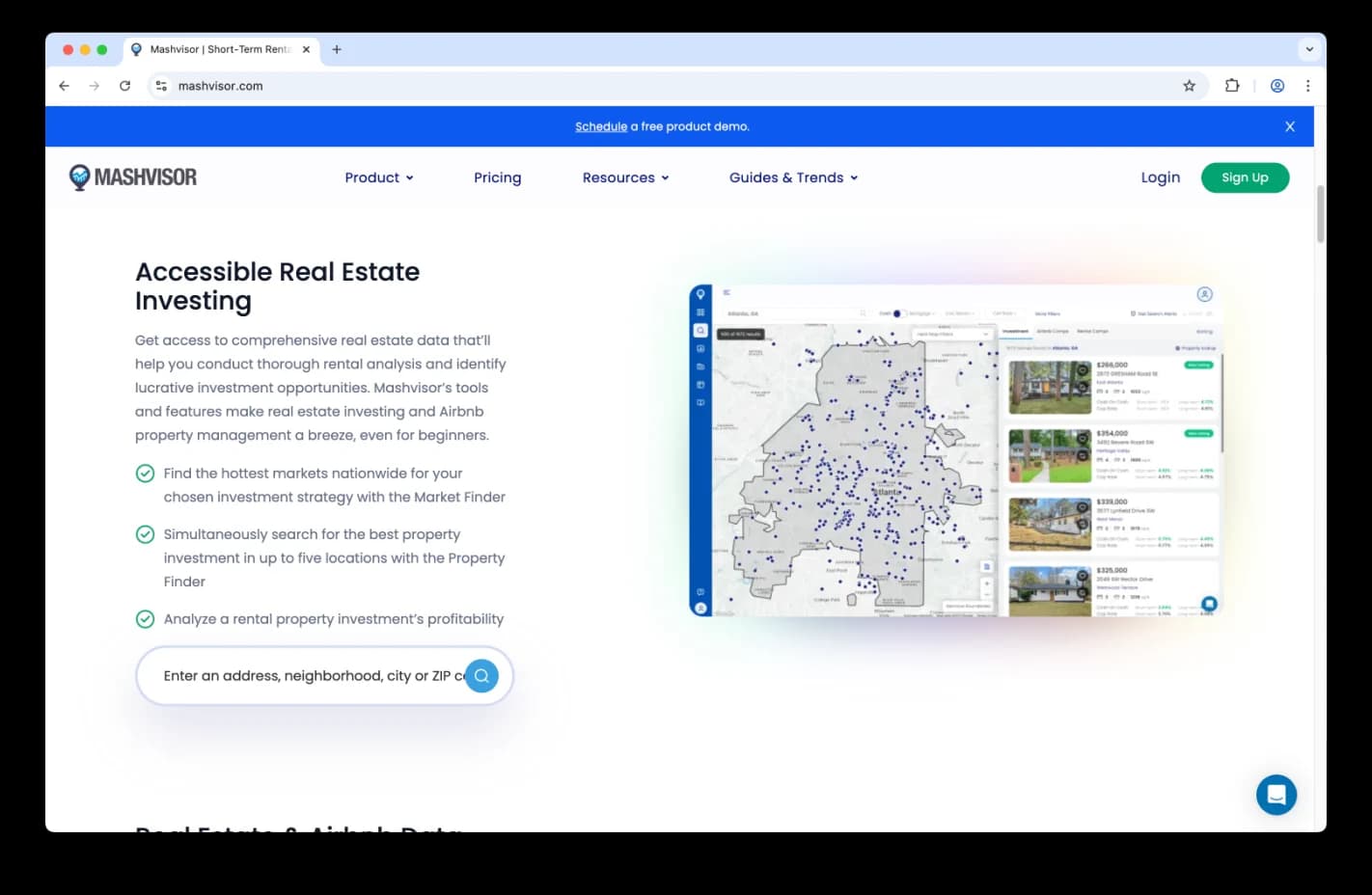
The number of properties this API covers is not that impressive (around 450,000), but it is specifically geared towards residential rentals (both long- and short-term). The data it refers users to is provided not only by public records and MLS but also by user-generated content, census information, and proprietary algorithms. Thanks to it, individuals and companies obtain:
- Property characteristics (owner information, neighborhood data, rental and sales history, tax details, and more).
- Short-term and long-term rental details (occupancy estimates, cash flow, pricing dynamics, forecasts of income based on area’s income, etc.).
- Rental rates, classified by the number of bedrooms.
- Advanced analytics leveraging big data and AI technologies that are a good crutch in evaluating investment potential and predicting possible ROI.
- Integration with Airbnb listings.
- Mortgage calculator.
Mashvisor’s monthly subscription plans serve different users (from individual investors to real estate firms) and are generally quite affordable (between $30 and $120). And you can get the product’s free demo version on request.
8.AirDNA
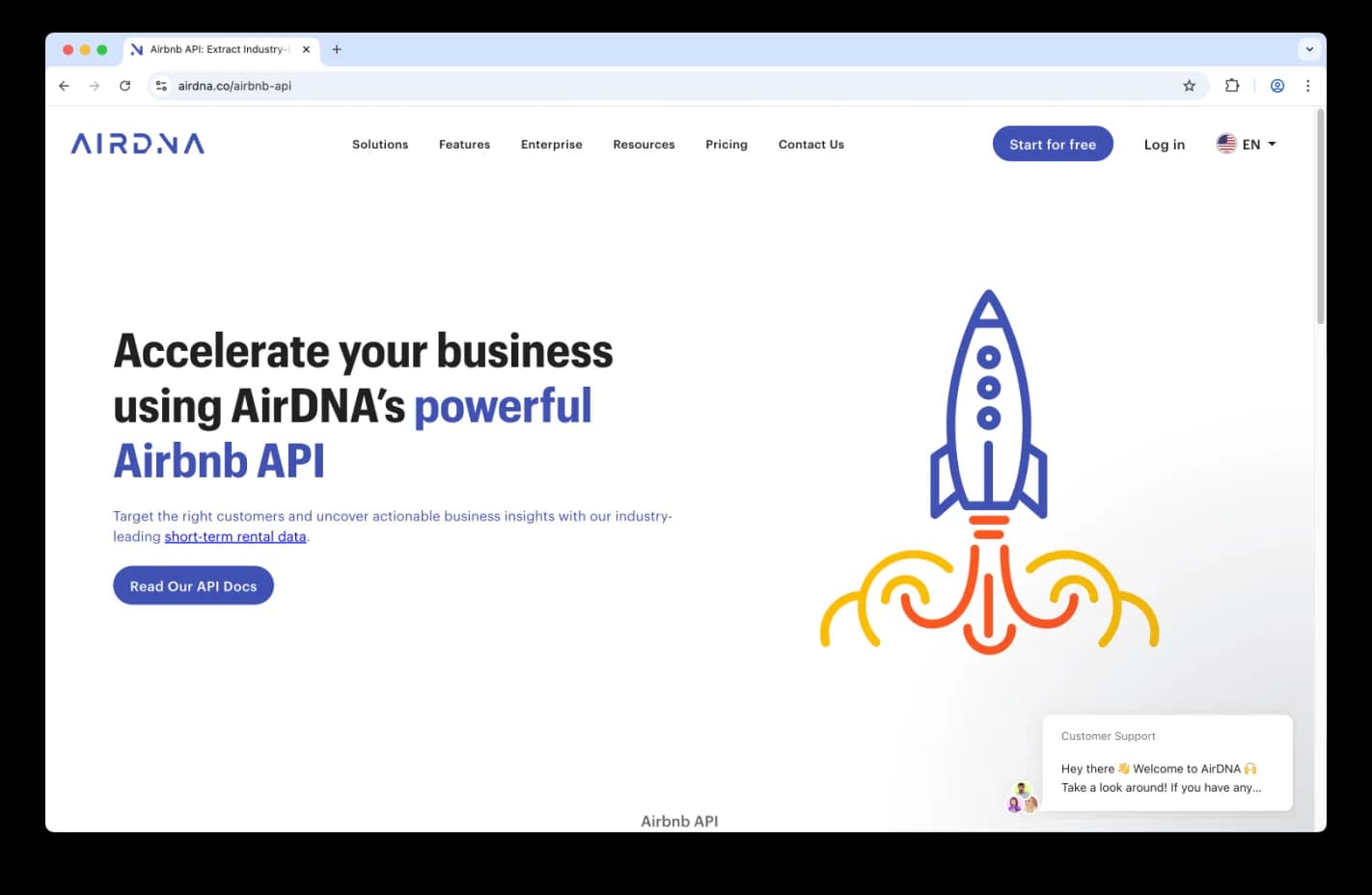
The target audience of this API consists of Airbnb and Vrbo stakeholders (mainly property owners and managers) who can enjoy valuable insights into the profitability, pricing, and performance of their property in short-term rental contracts. The data quality here is CBRE-controlled, which ensures its 96%+ accuracy for revenues and 97.5% for vacation rental offers. Such data includes:
- Listings with property attributes, rental performance, and availability at a given date.
- Property valuations (monthly and annual revenues, average daily rates, comparable occupancy projections, and more).
- Market data comprising market statistics over the previous month and a collection of historical and forecasted data on demand, supply, rates, revenue, and occupancy of property for rent.
- Smart rates, where dynamic pricing info is given alongside recommendations for establishing rates.
Free trials for this API aren’t available, but you can apply for a demo. Monthly subscription plans vary from the most basic $12 to the advanced $599.
9.RentCast
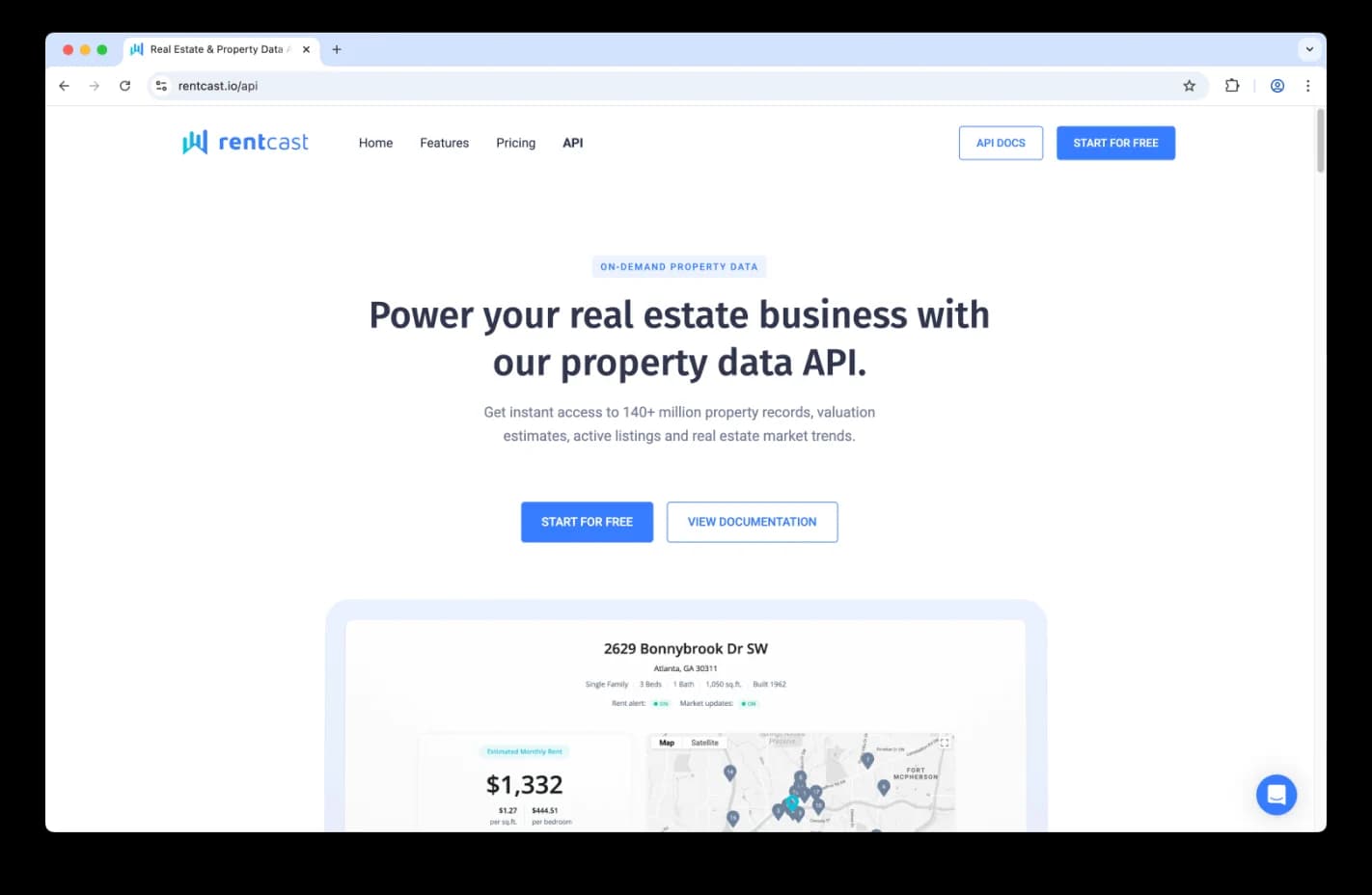
As it is easy to guess from the name, this API has the same focus as the previous one. Fueled by Realty Mole, the solution gives on-demand access to over 140,000 residential and commercial property records across the USA. They cover the following information:
- Property descriptions (features, structural attributes, current owner details, last sale information, and tax assessment history).
- Rental estimates and comparisons with a possible range of rates based on property details.
- Market trends with historical data, market averages, and composition statistics by zip code.
- Active for-sale and for-rent listings containing status, price, descriptions, and period on the market.
A free plan enables up to 50 requests per month. If you need more, you can choose among several paid plans, the most expensive of which is $449.
10.Compstak
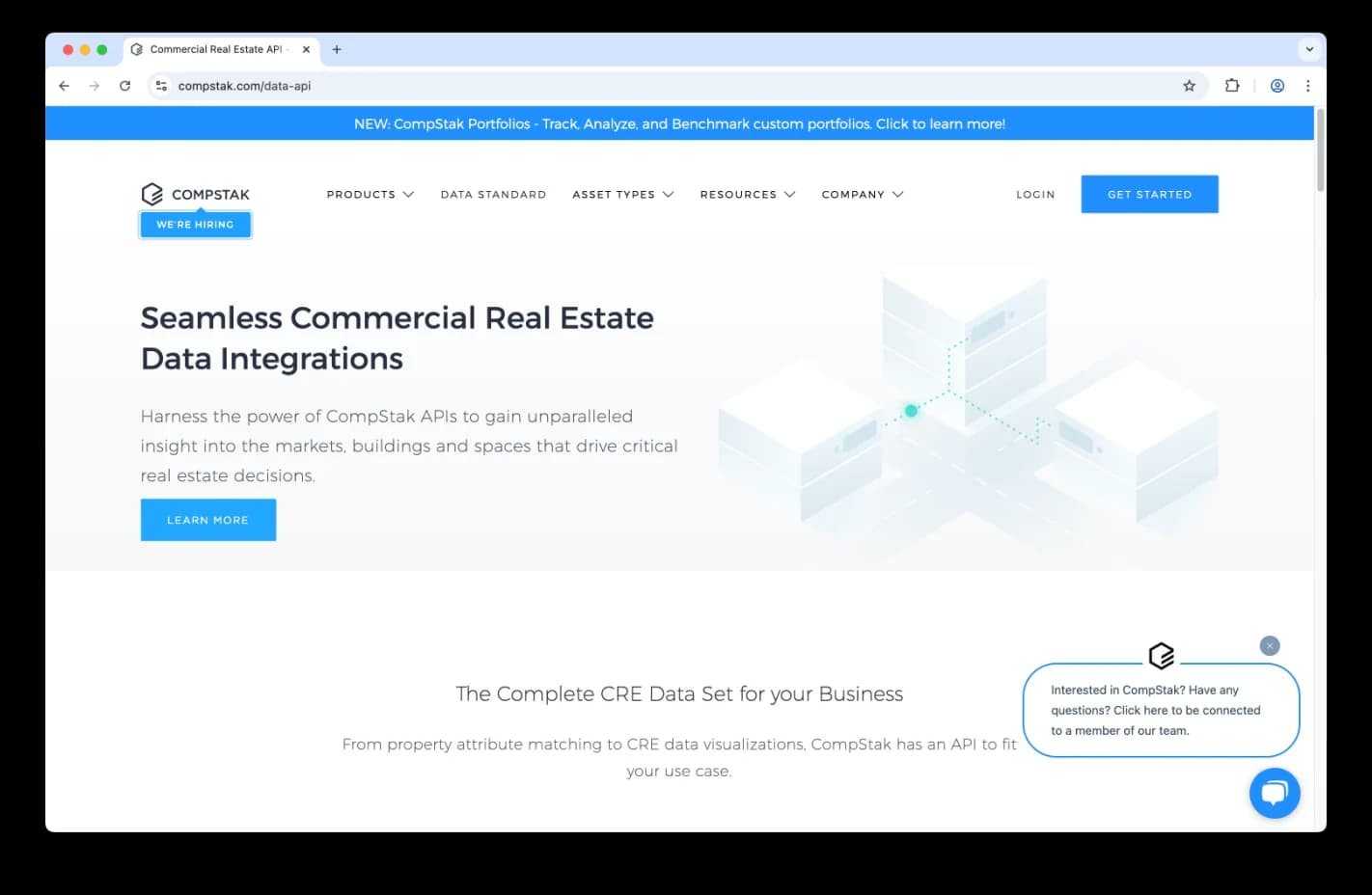
The API’s focus is comparisons and market analytics for commercial real estate delivered not only by public records but also by appraisal firms and brokerages. The platform’s capabilities include:
- Property standardization with multiple addresses, parcels, and more, enabling users to match and eliminate data.
- Property data comparisons based on a range of categories (square footage, free and historical market rent, work value, lease term, cap value, and more) that enable accurate rent calculation.
- Market insights with visualized reports and heat maps showcasing rents and concessions across multiple markets.
The crucial upside of this API is its free nature. Plus, you can apply for a demo on the site.
As you can see, there are plenty of real estate APIs out there. How can you choose the one that suits your use case to a tee?
Tips for Selecting the Right Real Estate API

As a vetted software company with extensive experience in application development, we recommend you follow a straightforward algorithm while opting for a real estate API.
Determine your needs
You should have a clear vision of real estate data users and their goals.
Study available offers
Dig deep into details about various API providers, paying attention to information sources they work with, API uptime, available data points, update frequency, granularity, data restrictions, usage examples, discrepancy resolution, API documentation, support they provide, and other vital parameters.
Consider data quality
In real estate, data accuracy, precision, transparency, reliability, and relevance are mission-critical. Make sure providers guarantee them.
Assess the tech stack
Artificial intelligence, machine learning, big data, virtual and augmented reality, and other disruptive technologies can give your company’s efficiency and performance a powerful boost.
Conduct feature/price comparison
Many organizations view the price as the ultimate tipping factor when making a purchasing decision. However, you should look carefully into what you receive for your money to ensure the characteristics roster dovetails into your business needs.
Epilogue
Modern real estate enterprises can’t do without specialized APIs that streamline and facilitate their pipeline operations and improve the quality of services they provide to corporate and individual customers. The same is true of proptech developers, whose efforts aimed at creating robust real estate professional solutions are dramatically enhanced. By leveraging APIs, software vendors can deliver real estate products faster and at a lower cost, whereas real estate stakeholders enjoy 24/7 access to reliable databases and can leverage advanced tools that streamline and facilitate shop floor processes.
Since the choice of available APIs is vast, you should consider your needs, compare offers in the niche, and pay close attention to their prices and features. Seasoned professionals of Implex can lend you a helping hand in selecting the most appropriate real estate API and integrating it into a proptech ecosystem your company employs in its pipeline routines.



